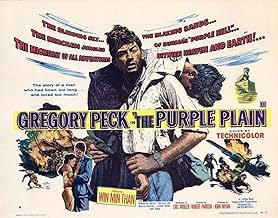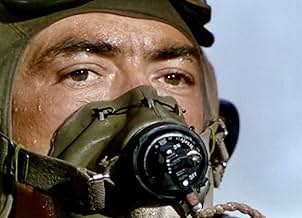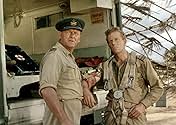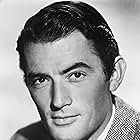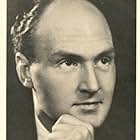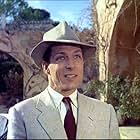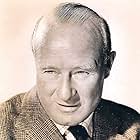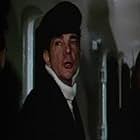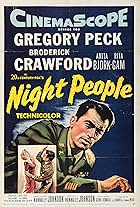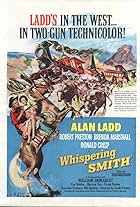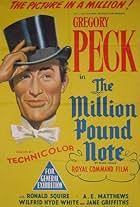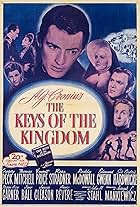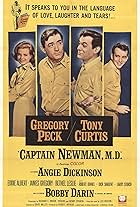IMDb RATING
6.5/10
2.6K
YOUR RATING
In World War II Burma, a Canadian bomber pilot becomes reckless after losing his bride in a Luftwaffe air raid.In World War II Burma, a Canadian bomber pilot becomes reckless after losing his bride in a Luftwaffe air raid.In World War II Burma, a Canadian bomber pilot becomes reckless after losing his bride in a Luftwaffe air raid.
- Nominated for 4 BAFTA Awards
- 4 nominations total
Brenda de Banzie
- Miss McNab
- (as Brenda De Banzie)
Dorothy Alison
- Nurse
- (uncredited)
Peter Arne
- Flight Lieutenant
- (uncredited)
Ernest Blyth
- Man Dancing at Wedding
- (uncredited)
Richard Duke
- Nightclub Patron on Dance Floor
- (uncredited)
Jack McNaughton
- Sgt. Ralph Brown
- (uncredited)
Lane Meddick
- Radio Operator
- (uncredited)
Harold Siddons
- Navigator Williams
- (uncredited)
Mya Mya Spencer
- Dorothy
- (uncredited)
- Director
- Writers
- All cast & crew
- Production, box office & more at IMDbPro
Storyline
Did you know
- TriviaWin Min Than's husband was so jealous about losing her to the film's "decadent" Hollywood star Gregory Peck, he ordered his wife to eat garlic before romantic scenes with Peck. Fortunately, the production crew was able to convince her husband that Peck and the others were respectful of her so he went home leaving her to finish the picture in peace.
- GoofsWhen Peck's co-pilot looks out at the starboard engine, it is leaking some kind of fluid, but that fluid is running down the side of the engine. It's not showing any sign of what would have to be, at least a 200 mph wind, passing over the nacelle.
- Quotes
Anna: It's not good to die inside.
Squadron Leader Bill Forrester: It's like living a bad dream.
Anna: Here we bury the dead in the earth not in our hearts. Is the dream over now?
Squadron Leader Bill Forrester: I think so.
- Crazy creditsOpening credits prologue: BURMA 1945
- ConnectionsReferenced in Toon in with Me: On This Day... June 25th (2024)
Featured review
Purple Plain is an obscure film in Peck's long list of movie credits. I don't know if this British production got much publicity or release stateside, despite Peck's movie star celebrity. Unfortunately, it's never been a TV regular, which is too bad because this tale of renewal and survival is an unusual and gripping one, in spite of the obscurity.
The film opens in the Burmese jungle during WWII. Peck is a battle fatigued flyer on the ragged edge of breakdown. He's about to be relieved because of erratic behavior, all the while he's flashing back on his wife's death in a London air-raid. These are well-done scenes causing us to sympathize with his loss. Nonetheless, he's jeopardizing his comrades with reckless manuevers because the loss has undermined his will-to-live. Thus, we're torn between sympathy and concern, just like the flight station doctor (Bernard Lee).
In an interesting move, Lee overcomes Peck's agonies by reconnecting him socially, in this case with a nearby missionary community. There Peck finds the vital human relationships so importantly missing from his death-dealing combat duties. As a result, his life takes on new meaning and purpose as a result of rejoining a human community where such life-giving affirmations can emerge. On the whole these are well-done scenes, especially the chaos from the Japanese air attack. In the midst of the carnage, Peck's combat flyer finds a new role in helping to bandage up survivors. Herein lies the movie's basic message and it's an important and humane one, conveyed in fairly subtle fashion, though the turn-around occurs more quickly than I would have liked.
Nonetheless, it's interesting that the script avoids the usual officially sanctioned head-doctor therapies. Note that Peck is not sent to be counseled by an air force psychiatrist, nor to join a chest-baring therapy group, nor to have his past puzzled together Freudian style. Of course, the happy solution here remains a "movie" solution where-- as we all know-- anything can be made to magically happen. Still, for a war-movie setting, the simple affirmation that mental health lies through nurturing social relations and not through government sanctioned killing remains no less suggestive because of its movie origins.
The remainder of the film amounts to a survival trek through the wilds of southeast Asia. It's a well-filmed and harrowing struggle against a forbidding landscape where the crash survivors must decide between staying put or hiking out against great odds. But most importantly, it's Peck's chance to regain his humanity by facing up to the odds, not just for his own survival, but for his two comrades as well. The movie's final scene could not have been better conceived. Indeed, no words are necessary. On the whole, this is a subtly and well thought out anti-war film, no less effective because it concerns the fate of one man rather than thousands.Too bad that its humane message remains so generally unseen.
The film opens in the Burmese jungle during WWII. Peck is a battle fatigued flyer on the ragged edge of breakdown. He's about to be relieved because of erratic behavior, all the while he's flashing back on his wife's death in a London air-raid. These are well-done scenes causing us to sympathize with his loss. Nonetheless, he's jeopardizing his comrades with reckless manuevers because the loss has undermined his will-to-live. Thus, we're torn between sympathy and concern, just like the flight station doctor (Bernard Lee).
In an interesting move, Lee overcomes Peck's agonies by reconnecting him socially, in this case with a nearby missionary community. There Peck finds the vital human relationships so importantly missing from his death-dealing combat duties. As a result, his life takes on new meaning and purpose as a result of rejoining a human community where such life-giving affirmations can emerge. On the whole these are well-done scenes, especially the chaos from the Japanese air attack. In the midst of the carnage, Peck's combat flyer finds a new role in helping to bandage up survivors. Herein lies the movie's basic message and it's an important and humane one, conveyed in fairly subtle fashion, though the turn-around occurs more quickly than I would have liked.
Nonetheless, it's interesting that the script avoids the usual officially sanctioned head-doctor therapies. Note that Peck is not sent to be counseled by an air force psychiatrist, nor to join a chest-baring therapy group, nor to have his past puzzled together Freudian style. Of course, the happy solution here remains a "movie" solution where-- as we all know-- anything can be made to magically happen. Still, for a war-movie setting, the simple affirmation that mental health lies through nurturing social relations and not through government sanctioned killing remains no less suggestive because of its movie origins.
The remainder of the film amounts to a survival trek through the wilds of southeast Asia. It's a well-filmed and harrowing struggle against a forbidding landscape where the crash survivors must decide between staying put or hiking out against great odds. But most importantly, it's Peck's chance to regain his humanity by facing up to the odds, not just for his own survival, but for his two comrades as well. The movie's final scene could not have been better conceived. Indeed, no words are necessary. On the whole, this is a subtly and well thought out anti-war film, no less effective because it concerns the fate of one man rather than thousands.Too bad that its humane message remains so generally unseen.
- dougdoepke
- Aug 3, 2008
- Permalink
- How long is The Purple Plain?Powered by Alexa
Details
Box office
- Budget
- $2,000,000 (estimated)
- Runtime1 hour 37 minutes
- Color
- Aspect ratio
- 1.66 : 1
Contribute to this page
Suggest an edit or add missing content


